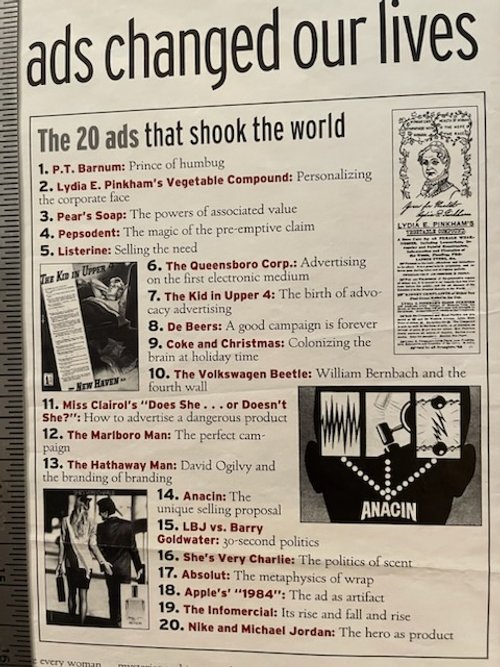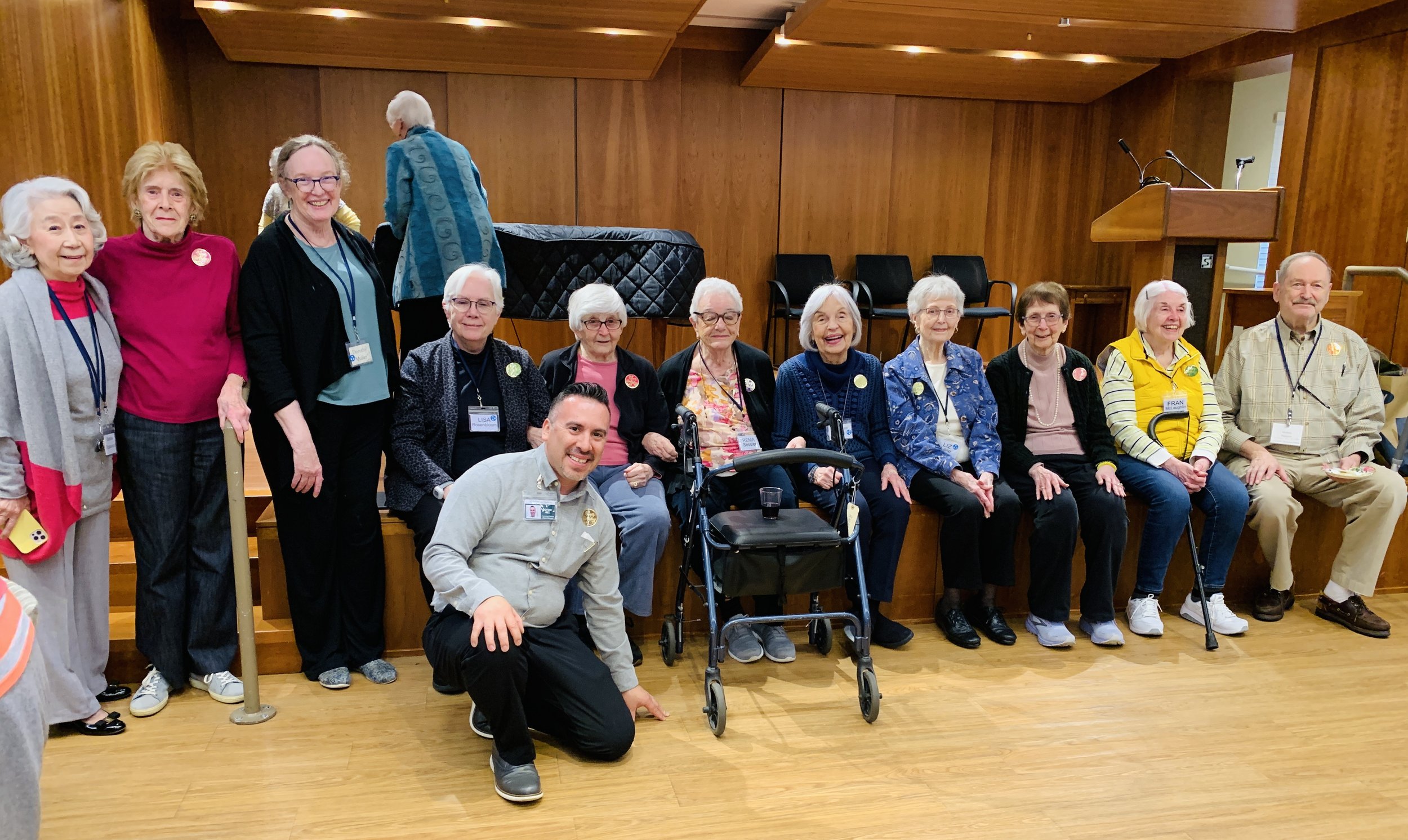Help Wanted: RA Investment Committee Member Needed!
Here’s the chance you’ve been waiting for: The five-member Investment Committee of the Residents Association has an opening for a member of the community who has prior experience and expertise in the world of money management.
Interested? Please put a note in Tom Wolzein’s cubby, x4316, by Friday, May 2.
Be a Co-Pilot: Fly High!
From the Attic: The Aroma of Change, ala 1973--and Beyond!
Sometimes “out of the attic” comes a memory of the work-world past.
The time was 1973. Revlon was joining what was then a world-changing movement now best known as The Women’s Revolution. It did so by deciding to change the face of traditional perfume advertising. Charlie perfume was born—and, with it, the Revlon Charlie perfume ad featuring a confident, modern woman plowing happily and forcefully through the world on her very own.
Fast forward to 1988. A new Charlie campaign, designed by our own Cathie Campbell, hit the market. It featured a woman patting a man on the backside, a playful representation of female self-sufficiency.
Revolutionary! It took the powers that be by surprise—and a wee bit of consternation—as depicted in a sketch Cathie did at the time of those to whom she presented the ad for approval (naturally, after the usual 3-martini lunch).
It was in the end accepted and pitched into the world. Playful? A paean to self-suffiency? Whoa! Not all agreed. There were those—The New York Times, for example—who criticized it as sexist and in poor taste. And the reaction, in turn, was dramatic.
And the ad campaign was a hit! And a significant marketing move for Revlon: within three years, Charlie became the world’s top-selling perfume. And in the ad world, too, making #16 in “The 20 Ads That Shook the World” list from Adweek.
Building Community Commitment
They came, they saw, they volunteered. And then they talked about it.
At the recent Residents Association Quarterly meeting, Carlisle Spivey chaired a panel of four residents who have helped build the spirit, energy, and actuality of community here at Kendal: Marianne Bloomfeld, Caroline Persell, Peter Roggemann, and Tom Wolzien. They talked among themselves about what they had expected from Kendal, how they had entered into the community, and what advice they’d have for new residents.
Photos by Harry Bloomfeld
The Weekly Kendal Low-Stakes Poker Report
The aim is fun, not financial windfall. Fear not any Atlantic City high-rollers joining in. All skill sets are welcome. Stakes are 25-50 cents.
Want to join the fun? Call or text John Vacher: (404) 556-0557. He’ll even come and provide a short tutorial, so you’ll fit in seamlessly your very first Wednesday night.
I Never Knew That
People Used to be Able to Send Children Through the US Mail
You can send a lot of things in the mail, but you can’t send a person—at least not anymore. There was nothing preventing people from mailing their own children in the early days of the US Postal Service’s parcel post service, though, and at least seven families took advantage of it. That includes the Beagues, an Ohio couple who in 1913 paid 15 cents in postage to mail their newborn son to his grandmother’s house a mile down the road. Beyond the novelty of it—when the parcel post service began on January 1, 1913, some were eager to see which packages they could get away with sending—it was a surprisingly practical way of getting one’s kiddo from point A to point B.
To start with, many people in rural areas knew their postal carriers fairly well, which meant the children were simply walked or carried on often-short trips. In other instances, children traveled on trains as Railway Mail, but with stamps instead of (usually more expensive) train tickets.
The longest known trip of a child through the mail occurred in 1915, when a 6-year-old was sent 720 miles from Florida to Virginia—a lengthy trip that cost just 15 cents.
Fortunately, there are no reports of children being injured by being sent through the mail. (Pictures of children in literal mailbags were staged.) The practice ended, as so many do, when certain higher-ups became aware of the loophole and decided to close it, also around 1915.
Source: interestingfacts.com
Contributed by Jane Hart
For Your Funny Bone
Art by Hart
Dobbin was ready for the Derby and the Boston Marathon
Sally Jane’s new tattoo left her backup singers speechless
Phuster’s medical team was stumped
As usual, Warren’s mind was occupied with hot and sour soup
It was high drama at the doll hospital
Art and photos by Jane Hart
Drawing with Scissors, by Sheila Benedis
Compassion II
Art and photo by Sheila Benedis
In and Around Kendal
April Birthdays at Kendal
Photo by Harry Bloomfeld
If a Tree Falls in the Park . . .
An elder elm took a bad fall
Photo by Carolyn Reiss
It was so-o-o-o big—even on its side, it was almost bigger than Debbie Bell
Photo by Carolyn Reiss
Portrait of a fallen hero
Photo by Edward Kasinec
Q: When Is a Hawk Not a Hawk?
A: When it’s a window decal from the Cornell Ornithology mailing sent to Philip Monteleoni! Coulda fooled me—and did!
Photo by Philip Monteleoni
Moon Set over the Hudson
Photo by Jeff O’Donnell
Ready for a Little Refresh?
First up: the PDR—cleared out and waiting to become the temporary kitchen . . .
Photo by Joe Bruno
They're Back!
The Stone Barns goats have returned to Rockwood Park—a true sign that spring is here. Kendal photographers were out in number to commemorate and celebrate their return. Yay!
The Return, by Edward Kasinec
And the kids came, too! by Carolyn Reiss
Inquisitive youngster, by Carolyn Reiss
Lots of room to roam, by Hubert Herring
It's That Time Again: Duckies Rule!
Yes, we know, you’re excited! We all are. It’s not every day that one gets to cheer on contestants of this caliber in an athletic competition this strenuous. We speak, of course, of the annual Rubber Ducky Derby, for which our Kendal—recognizing a good thing when they see it—one of the two leading sponsors.
The date is Saturday, April 26 The place is Patriots’ Park, right on Broadway as Sleepy Hollow becomes Tarrytown. The time is 11 am-3 pm. Races take place throughout the day as duckies tire and drop out, leaving the Big Winners!
The Hope Hose and Conqueror Fire Department help out by turning the gentle-flowing Andre’s Brook into a roiling river for dare-devil ducks.
The race is in support of the Rotary Club of the Tarrytowns in all of its philanthropic efforts to support and improve our communities. And Kendal is one of the two top sponsors of the race!
And you—yes, we’re talking about you—can get skin (or feathers) in the race! Adopt a Ducky! And while you’re at it, adopt 6 or a whole tub-full of that’s 13). The more you adopt, the cheaper they are.
And to give you some idea of what’s involved, a few pictures from last year’s race.
And they’re off!
You can feel the tension in the air!
Athletes at their best!
Danger is all around them. Some quack up under the stress.
I Never Knew That
Ancient Rome’s “Sacred Chickens” Made Predictions About the Future
One of the oldest religious practices in ancient Rome was augury, or reading signs from the gods through the behavior of birds, the idea being that the birds were deliberate divine messengers. Augurs, or bird divination experts, would sometimes draw diagrams on the ground to help them interpret behavior from owls, woodpeckers, crows, and other wild birds.
These avian messages, called auspices, were taken extremely seriously, but wild birds weren’t always around to deliver them — so eventually, ancient Roman priests started keeping “sacred chickens” that they could call upon at any time. These fortunetelling chickens were especially prized for military decisions, and would be consulted before any major moves to make sure the gods approved.
When their services were required, the chickens would be released from their cages and fed so that augurs could interpret their eating patterns. Broadly, a chicken refusing to eat was a very bad sign, while a chicken gobbling up its food while stomping its feet was a very good one.
The most notable cautionary tale about not heeding the fowls’ warnings came in 249 BCE. According to the ancient scholar Cicero, one Roman consul commanding a fleet of ships dismissed some bad omens before going into battle. When he was told the chickens wouldn’t eat, he ordered them thrown overboard, commenting, “Let them drink.” He was soundly defeated, and later recalled by the Roman Senate.
Source: historyfacts.org
Contributed by Jane Hart
For Your Funny Bone
Contributed by Barbara Bruno
Drawing with Scissors, by Sheila Benedis
Hope for the Future
Art and photo by Sheila Benedis
Art by Hart
Without a gun, Harkin kept the bad guys away with Silly String
Young Crake never failed to astonish his grandparents
Liz was everyone’s favorite gerbil nanny
Woofy’s antennae told him where he could find a real treat
Ruffin wondered what last year’s runner-up Kale Queen could ever see in him
Art and photos by Jane Hart
In and Around Kendal
A Big Turnout for an Alida False Alarm
Photo by Joe Bruno
Here at Last
Forsythia in the Sun, by Sue Bastian
Spring: the Free Florist, by Edward Kasinec
Spiffing up Rockwood Park for the Spring
Timber!
Gateway to the Hudson
Photos by Edward Kasinec
Sometimes the Big Ships Side Silently Past Kendal, by Joe Bruno
A Work in Progress: Independent-Living Healthcare Strategy at Kendal
Highlights from the March 27 and April 7 Meetings
An ad hoc committee to address the healthcare for Independent Living Residents (IL) was convened by Jean Eccleston to address the evolving healthcare environment and how to best support access to care for IL residents at KOH. Jean has assembled a team of residents with a range of backgrounds, along with relevant staff members and Board representation. The members are listed at the end of this report, and all are willing to hear from you about your concerns and suggestions.
One thing that quickly became apparent to us was that there is a wide range of understandings and expectations about healthcare provision for IL residents. The committee identified transparency, communication and education as important guidelines for our operation. To that end, regular updates at the Resident Council Meetings and posts of meeting highlights on the Resident Website will be provided.
Our initial work has been focused on educating ourselves about the current state of healthcare. We have reviewed the chronology of IL Healthcare at KOH, reached out to other CCRC communities about their experiences, and reviewed our Lifecare Contract so we all have a clear understanding of the services Kendal provides to its residents along the continuum of care. We are not alone in our struggles. Another local lifeplan community is not able to provide guaranteed staffing for PET activation by IL residents, and at times asks them to call 911. We are living in a brave, new world.
Seeking input from IL residents will be an essential part of our process, and we will be exploring how to best do that at our next meeting. We hope you will be a part of the process and look forward to your input.
Jean Eccleston Jessica Baron Jo Cameron Hildegarde Gray Erin Hennessey Mike Kornfield Jeff O’Donnell Ellen Ottstadt Hank Schacht Claire Tenny Art Vecchiotti Lisa Wacht Sharon Wexler
The Weekly Kendal Low-Stakes Poker Report!
The aim is fun, not financial windfall. Fear not any Atlantic City high-rollers joining in. All skill sets are welcome. Stakes are 25-50 cents.
Want to join the fun? Call or text John Vacher: (404) 556-0557. He’ll even come and provide a short tutorial, so you’ll fit in seamlessly your very first Wednesday night.






























































